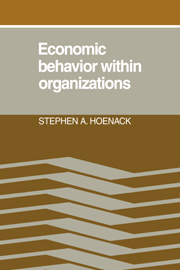Book contents
- Frontmatter
- Contents
- Preface
- 1 Introduction
- 2 Definitions and determinants of employees' discretion over an organization's resources and production
- 3 Employees' resource diversions and employers' imposition of resource responsibility
- 4 Short-run resource allocation under fixed budgets
- 5 Short-run resource allocation in response to demand: the cases of an employee, a private corporation, and a private nonprofit organization
- 6 Legislative demand and short-run price and output of the public organization
- 7 Employees' investment behavior and implications for suborganization
- 8 Equilibrium behavior of public and private organizations in the first long run
- 9 The demand and supply of nonmarket resource allocation
- 10 A brief summary and proposed directions for further work
- Notes
- References
- Core definitions
- Index
9 - The demand and supply of nonmarket resource allocation
Published online by Cambridge University Press: 05 November 2011
- Frontmatter
- Contents
- Preface
- 1 Introduction
- 2 Definitions and determinants of employees' discretion over an organization's resources and production
- 3 Employees' resource diversions and employers' imposition of resource responsibility
- 4 Short-run resource allocation under fixed budgets
- 5 Short-run resource allocation in response to demand: the cases of an employee, a private corporation, and a private nonprofit organization
- 6 Legislative demand and short-run price and output of the public organization
- 7 Employees' investment behavior and implications for suborganization
- 8 Equilibrium behavior of public and private organizations in the first long run
- 9 The demand and supply of nonmarket resource allocation
- 10 A brief summary and proposed directions for further work
- Notes
- References
- Core definitions
- Index
Summary
This chapter analyzes economic behavior in the second long run, a time period long enough for organizations to merge or change their status, for instance, from private to public or profit to nonprofit. If a merger or change in status increases the amount of economic activity occurring within organizations, the smaller the allocative role of market incentives relative to that of incentives within organizations. If these changes are accompanied by an increase in legislative demand, this additional intervention between citizens' demand and the organization's employees further reduces the allocative role of market incentives.
A change in an organization's status or its merger with another organization is an investment that can be initiated by employees as well as by the funding authority, but the funding authority can exercise the right to approve before one of these changes may take place. The investments that can alter an organization's status in various ways or merge it constitute the supply of these changes. There would be a change in the funding authority's returns from the organization as a result of these investments taking place. Employees' separate investments that influence the funding authority's expectations about these returns are their demands for mergers or changes in organizations' status. Demand affects supply when employees can sufficiently influence the funding authority's expected returns to a merger or change in the organization's status to alter his choice whether to permit it to take place.
- Type
- Chapter
- Information
- Economic Behaviour within Organizations , pp. 230 - 247Publisher: Cambridge University PressPrint publication year: 1983



